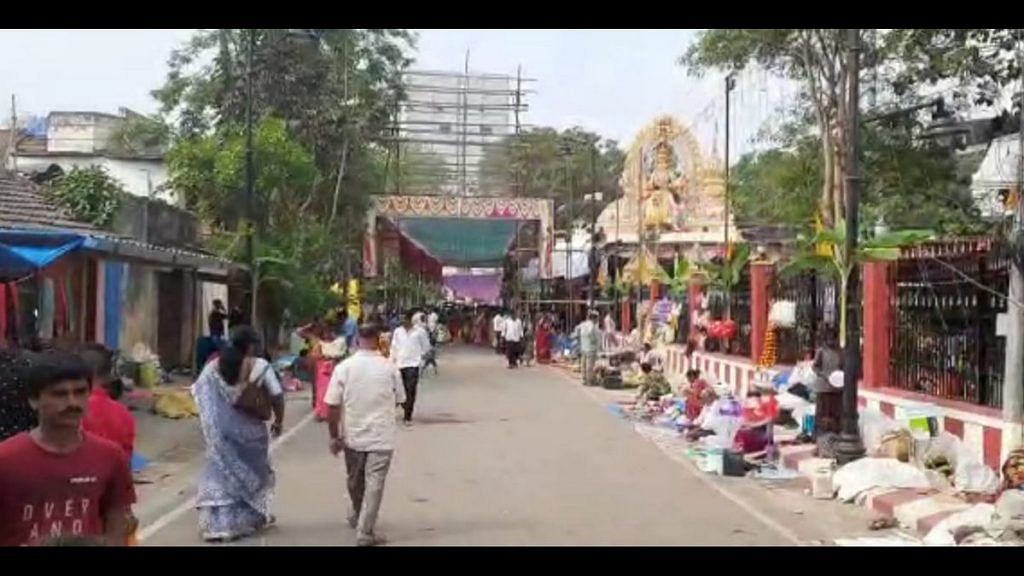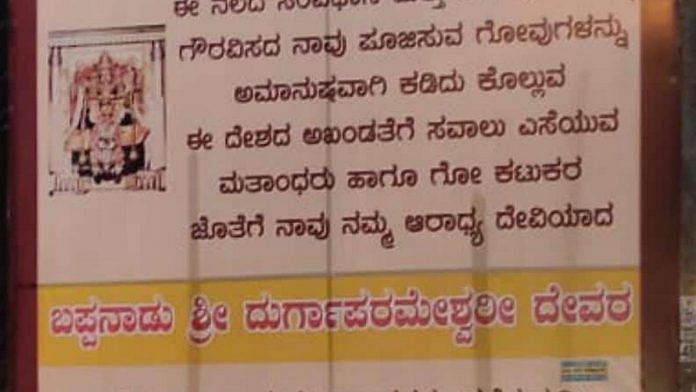Bengaluru: It’s a far cry from business as usual at Karnataka’s lively temple festivals. Covid restrictions have been lifted, but Hindutva groups have imposed new ones about who can put up shops and stalls, and who cannot.
“Hindus have become aware,” proclaims a poster outside the famous Bappanadu Shri Durgaparameshwari Temple in Mulki, about 25km from Mangaluru.
Written in Kannada, it lists out a few ‘rules’ for the ongoing temple fair: “We will not engage in business with those who don’t respect this land’s law and Constitution, those who slaughter the cattle we worship… We won’t let them set up business here either.” The sign-off on the poster says, “All Hindus”.
Ironically, the name ‘Bappanadu’ comes from a Muslim Beary trader who is believed to have built this Hindu temple. The temple authorities in Mulki have tried to take down posters like this one, but there has been a palpable change in the atmosphere, particularly in the wake of the hijab row, which started in Karnataka’s coastal belt last year.
Across the state, there have been at least half a dozen instances this year alone of Muslims being ‘banned’ from doing business at temple fairs. Hindutva organisations including the Vishva Hindu Parishad (VHP), Hindu Jagarana Vedike, and the Bajrang Dal have been submitting memorandums to temple authorities, municipal officials, and town councils, calling for a ban on Muslims setting up shops and stalls.
And, just in case Muslims do manage to put up stalls, the Hindutva groups have also been urging Hindus to boycott such traders.
The matter is becoming increasingly contentious. This Wednesday, opposition parties raised the issue of communally provocative banners and posters about banning Muslims at temple fairs in the Karnataka Assembly. However, BJP leaders offered little by way of response, with B.C. Nagesh, Minister of Primary and Secondary Education, saying that “reactions to actions” were not surprising — a reference to the call for a bandh by a Muslim religious leader in the wake of the hijab verdict.
Also Read: The politics behind Karnataka’s hijab row: Sliding Congress, rising SDPI, combative BJP
‘Why shouldn’t we boycott businesses run by them?’
When the Karnataka High Court upheld the ban on the hijab in educational institutions earlier this month, there was an outcry among many Muslims and a call from a cleric for a day-long shutdown across the state. This is the reason that some Hindutva organisations have given for their stance against Muslim shops at temple fairs.
“If they can oppose a high court order against the hijab and shut down shops owned by them in protest, why shouldn’t we boycott businesses run by them?” Prakash Kukkehalli, Mangaluru unit general secretary of the Hindu Jagarana Vedike, told ThePrint.

According to him, Hindus had been “tolerant” of Muslims doing business at temple fairs for many years, but would no longer allow it.
“This is our temple festival. We are creating awareness among Hindus that only Hindus should be allowed to set up shop and do business among ourselves,” Kukkehalli said.
This is not the only such instance in the state.
Last week, Bajrang Dal workers in Shivamogga allegedly forced a contractor who had allowed Muslims to set up shop for the Kote Sri Marikamba Devi Sannidhi Temple Fair to return the tender.
“The person who won the tender first for setting up shops withdrew his bid alleging that he was threatened by some people about allowing non-Hindus to set up shops,” S.M. Mariyappa, president of the temple association, told The Print.
The tender was finally awarded to one Nagaraj, backed by the Vishva Hindu Parishad and the Bajrang Dal, who during a meeting with temple authorities Saturday night said Muslims would not be allowed to set up shops. There was neither a police complaint nor action in the matter.
In Kollur in Udupi district, too, members of Hindutva outfits submitted memorandums to the local administration to ban Muslims from carrying out trade during the Shri Mookambika Temple fair.
Also in Udupi district, Muslims were reportedly prevented from setting up shops at fairs in Mahalingeshwara Temple in Padubidri and Sri Marigudi Temple in Kaup.
Suryanarayana, national co-convenor of the Bajrang Dal, told The Print that such moves were being done to thwart “anti-nationals”.
“We oppose anti-nationals, those who oppose court orders and laws of the land. We are creating awareness among Hindus to not engage in economic activity with them,” Suryanarayana said.
“We have no issues with Muslims who follow the law of the land. If they shut down their businesses protesting a court order then they are anti-nationals. If we engage in economic activity with them then we are indirectly funding their anti-national activities,” he added.
No legal action, issue raised in assembly
Opposition parties raised the issue in the Karnataka Assembly Wednesday afternoon.
“We have a history of communal harmony. Such instances — aimed at disrupting this peaceful society for whatever political reasons — should not be allowed. If we don’t protect the syncretic nature of our society, out children will suffer. This doesn’t impact just one community but society as a whole,” Congress MLA Rizwan Arshad told the assembly.
“The fundamentalist organisations spreading hatred must be stopped. Such boycotting of a section is unjust,” he added.
He was backed by U.T. Khader, the Congress’s deputy leader of the Opposition in the House and lone MLA from Dakshina Kannada.
“Such posters are coming up in public places and disrupting the peace. I commend temple authorities who are pulling these posters down, but the police department has to take action,” Khader said.
Responding to these concerns, Karnataka’s Law and Parliamentary Affairs Minister J.C. Madhuswamy insisted that “stray incidents” shouldn’t be yardstick by which to judge the government.
He also suggested that as long as restrictions did not extend beyond temple premises, it did not necessarily warrant action. “The rules of the Hindu Charitable Institutions and Endowments Act say tenders should not be given to non-Hindus on temple property. Those who are opposing Muslims setting up shops are citing this rule,” Madhuswamy said. “But, if such a boycott is being done outside temple premises, then we will take action.”
Chief Minister Basavaraj Bommai added that tender winners could use their discretion to decide on who could set up shops.
“Temple authorities lease out spaces near the temple to contractors during fests and fairs. Whoever wins the tender is given discretionary powers to sublet shops and units. We will look into the matter if there has been a violation,” Bommai told the Assembly.
Another minister in Bommai’s cabinet, B.C. Nagesh, however, reiterated the “action-reaction” rhetoric.
“Nobody had expected the Muslim community to call for a bandh on the high court’s order in the hijab row. What kind of response is that? Naturally there will be reactions to such actions,” he said.
Nagesh also pointed a finger at the Opposition in a press statement Wednesday: “Had the Opposition condemned the bandh call by Muslims over the high court order, there would have never been such a reaction.”
‘Clearly a case of promoting enmity, but little can be done’
Muslim organisations have so far not been very vocal on the matter and there have been no formal complaints either.
“We are hurt by the development. This is unfair to the small traders who come to set up shops at fairs for their livelihoods. We haven’t decided on the next course of action,” Ibrahim Saheb Kota, president of the Udupi Muslim Okkuta — an umbrella organisation of mosques, jamaats, and Islamic organisations in Udupi — told The Print.
In the absence of a formal complaint in any of the above instances, the police say there is not much they can do.
“It is clearly a case of promoting enmity between religions, but the issue comes under the jurisdiction of the Muzrai department [the Hindu Charitable Institutions and Endowments Department, which falls under the Revenue Ministry and is in charge of administration in registered Hindu temples across the state]. Unless there is a case or complaint, there is little that can be done,” a senior police officer from Dakshina Kannada told The Print.
“It is unfortunate that the rich and powerful across parties and religions remain friends, do business together, and profit out of it while common citizens who come to such fairs to earn their livelihoods by selling balloons, food, and petty items are being discriminated against,” he added.
Also Read: BJP vowed ‘justice for Hindutva worker murders’ in Karnataka. 3 yrs on, here’s where cases stand



